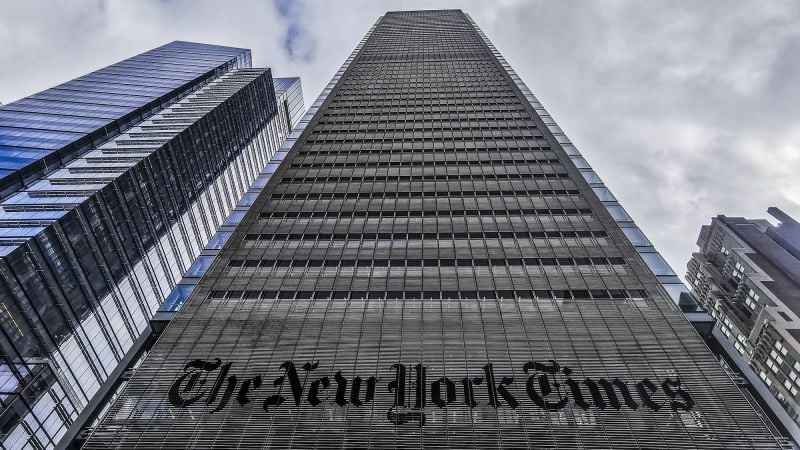The New York Times sues OpenAI and Microsoft for copyright infringement::The New York Times has sued OpenAI and Microsoft for copyright infringement, alleging that the companies’ artificial intelligence technology illegally copied millions of Times articles to train ChatGPT and other services to provide people with information – technology that now competes with the Times.



Taking someone else’s work and using it without crediting them or compensating them is theft. If Open AI made a deal with The NY Times to train its product using the papers content, which it would turn around and sell to its own customer base, that would be ethical. What Open AI and other companies like it are doing are stealing ahead of actual law that defines what they’re doing as such.
So listening to Billie Jean without thanking Michael Jackson is theft? That is use.
How about Billie Jean’s baseline which is borrowed from Hall and Oates I Can’t Go For That. Was that theft? Michael felt guilty about it but John felt it was routine for creatives to borrow from each other all the time.
How about money- and lobbyist-inspired extensions of copyright so extreme that both songs (heck, the whole oupuses of both artists) have been denied from the public domain? Is that theft too? Or does it only count when companies and rich estates are denied profits?
From your copyright infringement is theft blanket assertion and your inability or refusal to parse out fair use of copyrighted materials, I infer you don’t actually understand what copyright is or what purpose it is meant to serve to the public. You are just regurgitating the maximalist rhetoric you’ve been spoonfed. Its really kinda sad.
Feel free to exercise more nuance. Or if you like you can double down and remove all doubt.
Using a tool to copy someone else’s work and then profiting off that work without compensating or even attributing the source is stealing.
Your argument poses an interesting thought. Do machines have a right to fair use?
Humans can consume for the sake of enjoyment. Humans can consume without a specific purpose of compiling and delivering that information. Humans can do all this without having a specific goal of monetary gain. Software created by a for-profit privately held company is inherently created to consume data with the explicit purpose of generating monetary value. If that is the specific intent and design then all contributors should be compensated.
Then again, we can look no further than Google (the search engine, not the company) for an example that’s a closely related to the current situation. Google can host excerpts of data from billions of websites and serve that data up upon request without compensating those site owners in any way. I would argue that Google is different though because it literally cites every single source. A search result isn’t useful if we don’t know what site the result came from.
And my final thought - are works that AI generates is truly transformative? I can see arguments that go either way.
Machines do not have rights or obligations. They cannot be held liable to pay damages or be sentenced for crimes. They cannot commit copyright infringement. But I don’t think we’ll see “the machine did it” as a defense in court.
Usually they are original and not transformative.
Transformative implies that there is some infringement going on. Say, you make a cartoon with the recent Mickey Mouse. But instead of making the same kind of cartoon as Disney would, you use MM to criticize the policies of the Disney corporation (like South Park did). That transforms the work.
Sometimes AI spits out verbatim copies of training data. That is usually transformative. A couple pages of Harry Potter turn into a technical malfunction.
I hope you’ll answer a question in return:
Why? What’s the ethical/moral justification for this?
I know how anarcho-capitalists, so-called libertarians, and other such ideologies see it, but perhaps you have a different take. These groups are also not necessarily on board with the whole intellectual property concept. So that’s what I am curious about. Full disclosure: I am absolutely not on board with that kind of thinking and am unlikely to be convinced. But I am genuinely interested in learning more.
Just getting back around to this.
My main reasoning is simply that authors and artists should be fairly credited and compensated for their work. If I create something and share it on the internet, I don’t necessarily want a company to make money on that thing, especially if they’re making money to my exclusion.
So while I belive that IP as we know it today is probably not be the best way to handle things, I still think creators should have some say over how their works are used and should receive some reasonable share when their works are used for profit. Without creators, those works wouldn’t exist in the first place.
Are there other jobs where it would be okay to take a person’s services without paying them? What would motivate people to continue providing those services?
Hmm. I think you are missing some important information here.
I’m sure you know how it goes for most people who create property: EG Factory workers make some product, are paid for it, but do not own the product. The same is true for people who create intellectual property. They get paid for their work but the employer owns the property. You only own what you make in your own time, unless or until you sell it.
You’re talking about paying property owners for providing no services at all.